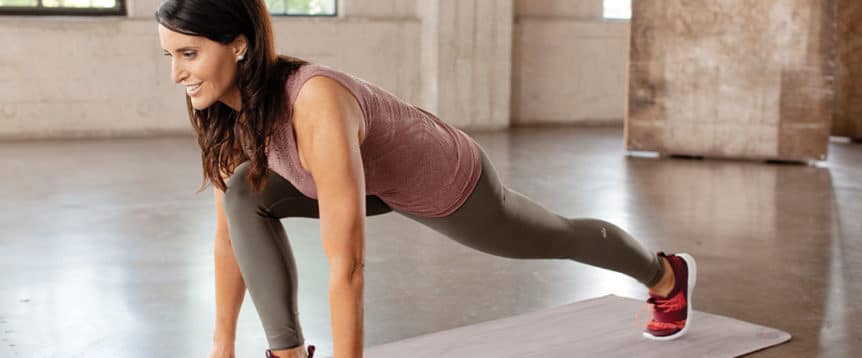Lockdown may be over, but we’re still not totally free to move about the cabin, so to speak. Consequently, most of us are stuck in “fight-or-flight” mode, says Juliet Kaska, a Los Angeles–based fitness-studio owner who’s trained the likes of Karlie Kloss and Pink.
“Our anxiety is up, so we’re having a harder time committing to things,” Kaska says. “People who used to come in five days a week can’t commit to even one day a week online.”
Commitments, however, are anchors, which is precisely what we need in these uncertain times. “We need to find anchors to calm our nervous system down—to root us in sight of all the upheaval,” Kaska explains.
“If people aren’t committing, what does that mean?” she continues, “They’re not working out as much. And what does that translate into? The Quarantine 15. So everybody’s gaining weight. Everyone’s getting sluggish. Then their motivation level goes down, which makes it even harder to commit.”
Here, Kaska offers three ways to stay committed to working out.
Put Money on It.
“Make the commitment by paying up front for something,” Kaska advises. “If you plan to just register for a free class at the last minute, you’re not likely to show up for it. That changes if you’ve already spent the money for it.” And if you do have to miss a class you paid for, check if they can send you a recording of it to do on your own, she suggests. Sometimes the file or link they send has a time expiration, which in itself can be a motivator.
Make It a Date.
Find a friend or family member who will commit to a class or workout schedule with you. Kaska tells about her best friend who recruited a bunch of friends to “attend” online workout classes at Kaska’s studio; then afterward, they stayed online for a social time. Kaska herself hosts virtual walking groups twice a week—and even more with some close friends—so she can connect with people and get movement in at the same time.
For even greater accountability, she sends a screenshot of her schedule to a certain friend every evening—from Sunday through Thursday—so there’s someone who can keep her on track if necessary. “It’s not like she’s messaging me all day saying, ‘Hey, did you get that meeting in?’” Kaska says. It’s just that her eyes are on it, my eyes are on it—it’s me committing to myself, and she’s just there to hold the space for me.”
Sound the Alarms.
Kaska is a big advocate of midday alarms on your phone, to remind you to take breaks and move around. She recommends setting alarms for every 45 to 90 minutes. “You could do a couple of stretches, walk around the office or your house, or go walk the dog. Go sit quietly and do some breathing exercises—for just two minutes, five minutes. It doesn’t have to be a big production.” (Her pro tip: “It should be a pleasant alarm, not an annoying beacon—something kind to your soul.”)
She also suggests—if you have trouble setting aside chunks of time to exercise—breaking your workout up into three shorter segments—one in the morning, one midday, one in the evening. To get you started, she developed Move for You, three seven-minute workouts—one HIIT, one core (see video below), one stretching-focused—that you can sprinkle throughout the day (or power through all at once).
Should You Go Back to the Gym?
Many gyms across the country are reopening, but they’re not just opening, Kaska says. “I’ve been on a lot of calls for the fitness industry nationwide, and I can assure you we’re all making a lot of adjustments to be able to operate.”
Most facilities are running at a majorly reduced capacity and have implemented some form of “pods” or “stations,” minimizing the areas of the gym or “touch points” a guest would encounter while there. “And the cleaning protocols are endless,” Kaska says. “They’re probably cleaner than they’ve ever been.
Kaska recommends calling the gym before you return and asking for a copy of the protocols they’ve put in place.
Such protocols are proving to be a success in other countries, where fitness centers are reopening with social distancing and other anti-virus measures. For example, a government-funded survey in Norway concluded that, during a two-week trial period, there was no evidence of gym-related COVID-19 transmission.
Click here to access the two other Move for You segments.

